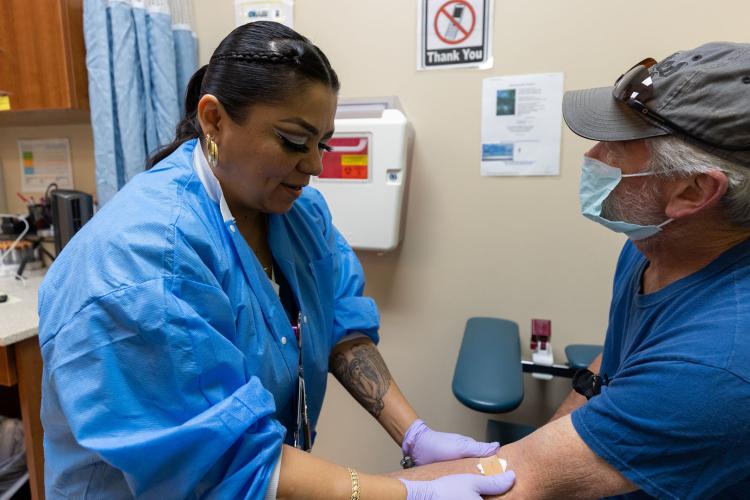
Prioritizing the physical and mental health of men is essential to their well-being. The societal stigma surrounding the role of men implies that they should always be strong, and any display of vulnerability is considered unacceptable, so men often deprioritize their health needs. Dr. James Haliburton, Medical Director, Psychiatry, emphasizes the importance of men prioritizing their mental health, as they tend to suffer in silence and keep going. This can have a detrimental impact on their mental and physical health.
“It’s important for us to talk about men’s mental health because men are people too,” Dr. Haliburton said. “Everyone deserves to have mental health awareness. When you think about mental health, it’s a secret. We have people who are living their lives and going by day to day. They’re providing for their family and just making it, and it’s weighing on them. They feel they have to carry the world on their shoulders and often neglect themselves.”
According to Dr. Haliburton, it is crucial to monitor your mental health, especially during the holiday season. The holidays can bring significant pressure, including family and financial worries, impacting your mental well-being.
“When I think about men’s mental health awareness, this is the right time to really think about and prioritize it,” Dr. Haliburton said. “During the holidays, there are so many things we wouldn’t normally do, like go to houses and ask for candy or give gifts to everyone you know. We’re doing things we would never do on a normal day, which adds stress. So, this is a great time for men to look at themselves and go, ‘I take care of everyone else. Am I taking care of me?’”
"It’s important for us to talk about men’s mental health because men are people too. Everyone deserves to have mental health awareness."
Men can sometimes face difficulties when it comes to expressing their emotions. Dr. Haliburton explains that their "emotional vocabulary" might be limited, making it hard for them to convey their feelings. As a result, their intentions might be perceived differently than they intended them to be.
"We're not allowed to have emotions," Dr. Haliburton said. "So, it comes out as anger when really it could be sadness. I think that is part of why it's kept a secret because they are often expected to be the breadwinners and support everyone else, and that doesn't leave time for self-care."
Recognizing that there is a problem is the crucial first step for anyone, especially men, to seek help for their mental health. The stigma that has surrounded mental health for so long has often discouraged people from addressing the root of their problems, but once it is accepted, Dr. Haliburton says it can make a big difference.
"I think men are very good at getting help once we know there's a problem," Dr. Haliburton said. "I had a ton of men when I was in private practice that had no issue coming to the doctor at all and no issue coming to a psychiatrist once they admitted there was a problem. I think that's where everyone in our society gets to when you realize you don't want there to be a problem."
Changes in a person's mood can be a sign of underlying issues. Dr. Haliburton shares other signs of mental health struggles for families to identify.
"Sleep in a huge piece," Dr. Haliburton said. "People need sleep. When people aren't sleeping, you start thinking, 'Why am I not sleeping?' 'Am I depressed?' 'Am I anxious?' You should also look out for poor concentration, poor attention – not being present, not doing things you used to do, change in dietary habits, more comfort food, less food, weight gain, and weight loss."
If you are hesitant to seek help, Dr. Haliburton recommends discussing it a regular check-up to make talking about it easier.
"If you need to have your blood pressure or diabetes checked out or your yearly exam, make that the time you say, 'Hey, I need the help.' Because people are more likely to seek help when they're talking about something else," Dr. Haliburton said. "If they don't know how to access it, they can always call JPS Health Network and talk to one of our intake specialists and say, 'I need help, and I don't know where to start.'"
If you or a loved one are in need of behavioral health resources, someone to talk to, or help scheduling an appointment, visit the JPS Behavioral Health page.
